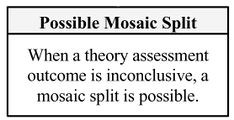Mechanism of Mosaic Split
What happens to a mosaic when two or more similar theories are considered equally acceptable by a scientific community? Under what conditions does a mosaic split occur? What happens to a mosaic when it is transformed into two or more mosaics?
If two or more competing theories are considered equally acceptable by a scientific community, the community can divide itself based on which theory they choose to acceptance. When this division occurs, the mosaic of the community is transformed into two or more mosaics.
In the scientonomic context, this question was first formulated by Hakob Barseghyan in 2015. The question is currently accepted as a legitimate topic for discussion by Scientonomy community.
In Scientonomy, the accepted answers to the question can be summarized as follows:
- When two mutually incompatible theories satisfy the requirements of the current method, the mosaic necessarily splits in two. When a theory assessment outcome is inconclusive, a mosaic split is possible. When a mosaic split is a result of the acceptance of only one theory, it can only be a result of inconclusive theory assessment.
Contents
Scientonomic History
Acceptance Record
| Community | Accepted From | Acceptance Indicators | Still Accepted | Accepted Until | Rejection Indicators |
|---|---|---|---|---|---|
| Scientonomy | 1 January 2016 | This is when the community accepted its first answers to this question, the Necessary Mosaic Split theorem (Barseghyan-2015) and the Possible Mosaic Split theorem (Barseghyan-2015), which indicates that the question is itself considered legitimate. | Yes |
All Theories
| Theory | Formulation | Formulated In |
|---|---|---|
| Necessary Mosaic Split theorem (Barseghyan-2015) | When two mutually incompatible theories satisfy the requirements of the current method, the mosaic necessarily splits in two. | 2015 |
| Possible Mosaic Split theorem (Barseghyan-2015) | When a theory assessment outcome is inconclusive, a mosaic split is possible. | 2015 |
| Split Due to Inconclusiveness theorem (Barseghyan-2015) | When a mosaic split is a result of the acceptance of only one theory, it can only be a result of inconclusive theory assessment. | 2015 |
If an answer to this question is missing, please click here to add it.
Accepted Theories
| Community | Theory | Accepted From | Accepted Until |
|---|---|---|---|
| Scientonomy | Necessary Mosaic Split theorem (Barseghyan-2015) | 1 January 2016 | |
| Scientonomy | Possible Mosaic Split theorem (Barseghyan-2015) | 1 January 2016 | |
| Scientonomy | Split Due to Inconclusiveness theorem (Barseghyan-2015) | 1 January 2016 |
Suggested Modifications
Current View
In Scientonomy, the accepted answers to the question are Necessary Mosaic Split theorem (Barseghyan-2015), Possible Mosaic Split theorem (Barseghyan-2015) and Split Due to Inconclusiveness theorem (Barseghyan-2015).
Necessary Mosaic Split theorem (Barseghyan-2015) states: "When two mutually incompatible theories satisfy the requirements of the current method, the mosaic necessarily splits in two."
Necessary mosaic split is a form of mosaic split that must happen if it is ever the case that two incompatible theories both become accepted under the employed method of the time. Since the theories are incompatible, under the zeroth law, they cannot be accepted into the same mosaic, and a mosaic split must then occur, as a matter of logical necessity.1pp. 204-207 The necessary mosaic split theorem is thus required to escape the contradiction entailed by the acceptance of two or more incompatible theories. In a situation where this sort of contradiction obtains the mosaic is split and distinct communities are formed each of which bears its own mosaic, and each mosaic will include exactly one of the theories being assessed. By the third law, each mosaic will also have a distinct method that precludes the acceptance of the other contender theory.
Possible Mosaic Split theorem (Barseghyan-2015) states: "When a theory assessment outcome is inconclusive, a mosaic split is possible."
Possible mosaic split is a form of mosaic split that can happen if it is ever the case that theory assessment reaches an inconclusive result. In this case, a mosaic split can, but need not necessarily, result.1pp. 208-213 That is, "the sufficient condition for this second variety of mosaic split is an element of inconclusiveness in the assessment outcome of at least one of the contender theories".1p. 208
Barseghyan notes that, "if there have been any actual cases of inconclusive theory assessment, they can be detected only indirectly".1p. 208 Therefore:
One way of detecting an inconclusive theory assessment is through studying a particular instance of mosaic split. Unlike inconclusiveness, mosaic split is something that is readily detectable. As long as the historical record of a time period is available, it is normally possible to tell whether there was one united mosaic or whether there were several different mosaics. For instance, we are quite confident that in the 17th and 18th centuries there were many differences between the British and French mosaics.1p. 208
Thus, the historical examples of mosaic split below also serve as points of detection for historical instances of inconclusive theory assessment.
Split Due to Inconclusiveness theorem (Barseghyan-2015) states: "When a mosaic split is a result of the acceptance of only one theory, it can only be a result of inconclusive theory assessment."
Split due to inconclusiveness can occur when two mutually incompatible theories are accepted simultaneously by the same community.
Related Topics
This question is a subquestion of Mechanism of Scientific Change.
It has the following sub-topic(s):
This topic is also related to the following topic(s):


